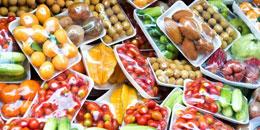‘Food packaging’ ban will harm Canadians

Guest Commentary
By Julio Mejía and Elmira Aliakbari
The Trudeau government, which recently banned plastic bags nationwide, is now considering a ban on plastic “food packaging” in support of its ambitious "Zero Plastic Waste by 2030" goal. However, if the government bans plastic food packaging, it will impose real economic costs on Canadians and jeopardize their health, for virtually no discernible environmental benefit.
First, let’s put plastic pollution in perspective. Canada contributes an estimated 0.4 percent of all plastic waste in the world, including just 0.02 percent of all plastic waste in the world’s oceans. Five countries—China, the United States, Germany, Brazil and Japan—generate nearly 50 percent of global plastic waste. And 90 percent of the world’s ocean plastic waste comes from Asia and Africa. Even if the government achieved “Zero Plastic Waste by 2030,” the effect on global plastic waste would be undetectable.
Before these bans, Canada’s track record on managing plastic waste was outstanding, ranking 49th out of 158 countries for minimizing mismanaged plastic waste (measured on a per-person basis). The federal government acknowledges this fact in its own report where it also states that 99 percent of the country’s plastic waste is already disposed of safely through recycling, incinerating and environmentally-friendly landfills.
Plastic bans pose real risks to human health and the environment. For example, according to a recent study in the Journal of Food Additives and Contaminants, like plastic straws, straws made from plant-based materials such as paper, wood and glass (common substitutes for plastic straws) also contain a class of chemicals known as per- and poly-fluoroalkyl substances (PFAS), which can persist for thousands of years and migrate through the soil, potentially contaminating sources of drinking water. This contamination exposes both wildlife and humans to potential negative effects on the immune system, thyroid function, liver and other adverse effects that are yet to be fully understood.
In other words, we don’t fully know how plastic alternatives will affect our health and the environment.
There are other costs. For example, plastic wrapping, which could soon be banned, is instrumental in food preservation, food transit and the reduction of food waste by protecting against contamination and spoilage throughout the food supply chain. Any type of plastic packaging can increase the time food lasts from days to weeks, allowing families to cut their grocery spending. In addition, plastic is the most cost-effective among common packaging materials, so forcing the food industry to transition to pricier alternatives will raise the cost of food packaging and these added expenses will be passed on to consumers through higher food prices.
To make matters worse, eliminating plastic food packaging could also negatively impact the environment from an emission standpoint. Why? Food production emits greenhouse gases (GHG) and the process of replacing spoiled food requires additional production, transportation and refrigeration, resulting in higher overall emissions.
Plastic substitutes such as paper are also heavier, require more energy to transport, present higher smog formation and ozone depletion potential, demand more water and energy to be produced, and ultimately result in higher greenhouse gas emissions. Researchers in Switzerland found that opting for plastic packaging for baby food, instead of glass, could reduce emissions by up to 33 percent, mainly due to reduced weight when being transported. So, the ban on plastics can have a detrimental, rather than a beneficial impact on the environment.
Overall, the pursuit of a “zero plastic” waste goal by banning more plastic products will jeopardize the health of Canadians, negatively impact the environment, and burden the already strained finances of Canadians.
Julio Mejía is a Junior Policy Analyst and Elmira Aliakbari is Director, Natural Resource Studies at the Fraser Institute.









